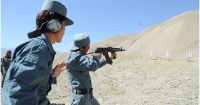HELMAND PROVINCE, Afghanistan, Sept. 1, 2011 — Marine Corps instructors at the Joint Sustainment Academy Southwest at Camp Leatherneck here are training an elite group of Afghan police in a first-of-its-kind program.
At the Provincial Response Company Course, or PRC, selected Afghan law enforcement officers are learning the skills required to engage terrorists, conduct hostage rescue operations and fight heavily armed criminals in urban environments. “The PRC unit’s training gives it the ability to respond at a moment’s notice and to handle situations outside the realm of the regular [Afghan Uniformed Police’s] capabilities,” said Marine Corps 1st Lt. Thomas L. Malone, a JSAS team leader and a native of Glen Burnie, Md.
“They will provide the provincial police chief a quick-reaction force for high-risk situations,” Malone added.
The six-week course reinforces and provides advanced training in shooting, self-defense, first aid, anti-terrorism, riot control, ethics and law.
The training is currently administered by a rotation of eight Marine instructors, 12 interpreters and two AUP class leaders.
“At the end of class there is no final exam,” Malone said. “However, there is a final exercise planned which tests knowledge retention by having students perform through a series of realistic training scenarios.”
The instructors hold students to a high standard from the beginning of class until graduation by testing them regularly on all material presented in the course, said Marine Corps Staff Sgt. Charles Spencer, a PRC course instructor and a native of Binghamton, N.Y.
To help in the urban training missions, the instructors make use of the academy’s “shoot house.” There, students learn to breach a secured compound and maneuver against opponents, clearing rooms in two- and four-man teams.
“Class exercises in finding improvised explosives devices and conducting vehicle [and] personnel searches, along with making arrests, are my favorite parts of the course,” said Abdul Mobin, an Afghan policeman currently attending the PRC course.
The training also stresses the leadership skills required in small teams and police units.
“We will be promoting some of the class non-commissioned officers based on their performance in the course,” said Marine Corps 1st Lt. Joshua Oresko, lead instructor and team mentor for the PRC course and a native of Crown Point, Ind.
Students will be well-trained and prepared to operate in the field when they graduate in September, Spencer said.
Source:
U.S. Department of Defense
Office of the Assistant Secretary of Defense (Public Affairs)

 von
von 